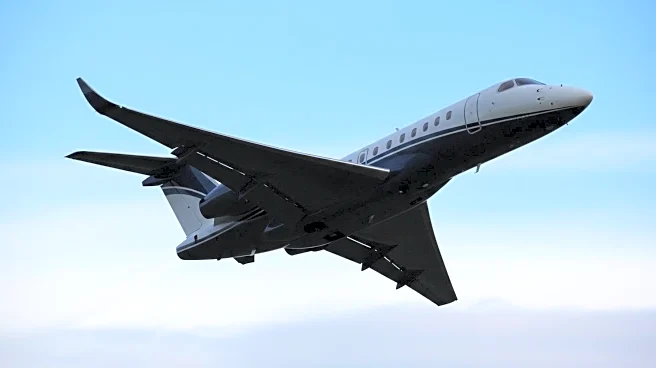What's Happening?
Nigeria's civil aviation regulator is evaluating the certification of China's C919 jet for use by domestic carriers. This initiative could introduce Chinese aircraft into Africa's largest aviation market. The Nigerian Civil Aviation Authority (NCAA), led by Director-General Capt. Chris Ona Najomo, is examining the certification process for the single-aisle jet, which is manufactured by China's state-owned COMAC. The C919 is China's competitor to Airbus and Boeing's narrow-body aircraft. COMAC has engaged in discussions with Nigerian officials to establish a presence in Africa, although it faces challenges such as the lack of benchmark certifications from Western regulators and delays in delivery schedules. COMAC has proposed maintenance and training support to Nigerian operators and is exploring dry lease deals, which involve leasing aircraft without a crew. Nigeria's improved Aviation Working Group rating, indicating stronger compliance with the Cape Town Convention on aircraft leasing, is enhancing lessor confidence and enabling the country's 13 airlines to access newer planes.
Why It's Important?
The potential certification of the C919 jet in Nigeria represents a significant shift in the aviation landscape, potentially increasing competition and diversifying aircraft options for Nigerian airlines. This move could enhance Nigeria's aviation market by providing access to newer and potentially more cost-effective aircraft, thereby reducing operational costs for airlines. The introduction of Chinese aircraft could also strengthen Nigeria-China relations and open up new avenues for trade and cooperation. For Nigerian airlines, the availability of the C919 could mean more competitive leasing options and improved fleet capabilities. However, the absence of Western certifications and trade tensions, such as the U.S. halting exports of CFM engines used in the C919, could pose challenges to the successful integration of these jets into the Nigerian market.
What's Next?
The NCAA will continue its examination of the certification process, which could take several months. If successful, Nigerian airlines may begin incorporating the C919 into their fleets, potentially leading to increased competition and lower airfares. Stakeholders, including Nigerian airlines and COMAC, will likely engage in further negotiations to finalize leasing and operational agreements. The broader aviation industry will be watching closely to see how this development impacts market dynamics and whether other African nations might follow Nigeria's lead in considering Chinese aircraft.
Beyond the Headlines
The certification of the C919 in Nigeria could have broader implications for the global aviation industry, particularly in terms of market diversification and geopolitical relations. It may signal a shift towards greater acceptance of Chinese-manufactured aircraft in international markets, challenging the dominance of Western manufacturers like Airbus and Boeing. Additionally, this development could influence aviation policies and regulatory standards in Africa, potentially leading to increased collaboration between African and Chinese aviation sectors.








